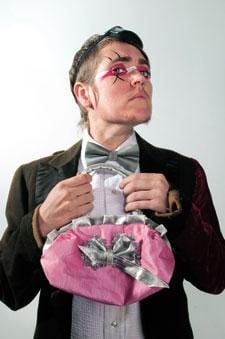Sunny Drake draws you in, holds you, exposes himself, challenges you, then dresses himself back up, leaving you different than when you arrived. That, at least, is the idea.
“Most of my work is autobiographically informed. I take my own story, lift it out into the living room of people’s own experiences and then place it within larger political narratives. My work is usually like my guts hung inside-out,” says Sunny Drake.
A self-described “feminist passionate about anti-racism and anti-capitalism,” Drake’s solo performance Other-wise is a coming out to his family.
“This show was kind of a letter to my family. Initially, I had intended on performatively tracking the process of coming out to my family as transgender. And I found I just couldn’t tell them. So the show became about how I couldn’t tell them and all the related issues and politics.
“Then I finally delivered the letter, a performance with my family in it in my home city, Brisbane. The original show helped me to have some juicy, amazing, frustrating and open conversations with my family. Then I created this next full-length version, which reflects the journey I’ve been on with my family through that process,” says Drake.
Originally from Australia, the performer, now 33, has been involved in theatre since his teens. Mostly self-trained, Drake credits many mentors for helping him throughout his performance journey.
“After years of treating theatre as a hobby, it’s now central to what I do,” says Drake.
Always an activist, Drake originally trained as an occupational therapist, worked in the field for five weeks, then ran away to blockade forests and ride his bike through the Australian desert. Now he travels the world performing Other-wise.
The 60-minute solo performance has earned Drake a following, several awards and the opportunity to bring people the change he wants to see.
“I want people to ask themselves the questions I have asked myself throughout this process: what am I prepared to risk to be the fullest me? I want people to experience the differences between us as well as connect with the similarities. Like for instance, a lot of people may not know what it’s like to be transgender, but I bet most people can relate to aspects of transgender experiences, like being worried someone won’t be proud of you, being bullied or discriminated against and having to find the courage to be yourself,” says Drake.
Drake also urges trans men to step up and be accountable for their male privilege.
“One of the key challenges I’m passionate about within trans communities is trans guys taking responsibility for inheriting masculine and/or male privilege, and working to support the immense challenges that trans women face, and cisgendered women and femmes. I see a lot of misogyny within queer communities, like how trans boys are celebrated and fetishized, whereas trans women are ostracized and isolated. I see masculinity glorified and femininity devalued. This needs to change!” says Drake.
Drake wants readers and viewers to know “that the show would be all about me, except that it’s all about you, too.”

 Why you can trust Xtra
Why you can trust Xtra


